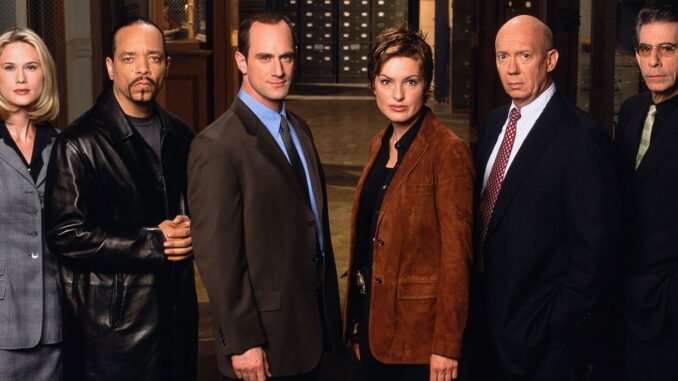
The Unseen Threads of Justice: Surprising Facts About Law & Order: SVU You Probably Did Not Know
For a quarter-century, the iconic "dun-dun" of Law & Order: Special Victims Unit has been the persistent, unsettling heartbeat of television. It's a show so ingrained in our cultural fabric that its characters, its cadence, and its relentless pursuit of justice feel almost as familiar as our own living rooms. Yet, beneath the surface of its grim narratives and unwavering moral compass lie surprising truths, hidden facets that illuminate not just the show's enduring legacy but also the profound impact it has quietly wrought on its cast, its audience, and even the world beyond the screen.
Perhaps the most astonishing, yet often understated, fact about SVU is its unprecedented longevity. While its status as the longest-running live-action primetime drama in American television history is widely known, the sheer scale of this achievement often gets lost in the casual mention. We're not talking about a few extra seasons; we're talking about outlasting sitcoms, soap operas, and nearly every other drama that debuted alongside it in 1999. This isn't just a testament to good writing or a strong cast; it speaks to the show's remarkable ability to evolve, to tackle increasingly complex and timely issues, and to maintain an unwavering relevance in a rapidly changing world. To think of a single scripted drama surviving and thriving through 9/11, multiple recessions, the MeToo movement, and a global pandemic, all while retaining its core audience and attracting new generations, is a feat that defies traditional television logic. It’s a cultural anchor that has outlived entire networks and viewing habits, a surprising testament to its adaptability and its potent subject matter.
Even more profoundly surprising is the transformative power the show has had on its lead, Mariska Hargitay, extending far beyond the realm of acting. Hargitay, who has portrayed Captain Olivia Benson since the very first episode, is not merely playing a role; she has become an unwitting, yet powerful, advocate. The sheer volume of letters and emails she received from survivors of sexual assault and domestic violence, pouring out their stories and seeking comfort because of her portrayal, led her to establish the Joyful Heart Foundation in 2004. This isn't a celebrity vanity project; it's a fully operational, impactful non-profit dedicated to healing, education, and advocacy for survivors. The fact that a fictional character, through the dedicated portrayal of an actor, could inspire such a tangible, life-changing organization is a testament to the show's realism and Hargitay's profound empathy. It blurs the lines between art and activism in a way few other television shows have ever achieved, revealing a surprising depth to its influence that ripples far beyond entertainment.
Speaking of unexpected journeys, consider the surprising trajectory of Ice-T, the acclaimed gangsta rapper, who seamlessly transitioned into the beloved, long-serving Detective Fin Tutuola. For those who followed his early music career, the idea of the incendiary artist behind "Cop Killer" morphing into a stalwart, morally grounded police detective for over two decades is nothing short of astonishing. Yet, Ice-T has not only endured but thrived, bringing a unique blend of street wisdom, deadpan humor, and surprising emotional depth to Fin. His character is often the voice of cynical reason, the grounding force in the squad room, and his presence has become indispensable. This unexpected casting choice, initially met with raised eyebrows, proved to be an inspired stroke of genius, illustrating the show's willingness to take risks and its ability to integrate diverse talents into its cohesive universe. It's a surprising testament to the power of reinvention and the human capacity for growth and unexpected evolution.
Finally, while the phrase "ripped from the headlines" is synonymous with the Law & Order franchise, the surprising truth lies in the meticulous, often ethical, process behind the adaptation. It’s not just a sensationalized copy-and-paste job. The show’s writers and producers engage in extensive research, consulting with actual law enforcement, legal experts, and victim advocates to ensure accuracy and sensitivity. More importantly, they use real events as a springboard to explore the moral ambiguities, systemic failures, and emotional toll of such crimes, often deliberately altering details to protect victims and avoid direct identification. The surprising element is the show’s consistent commitment to using these real-world events not for shock value, but as a catalyst for deeper societal conversations about justice, consent, power dynamics, and the often-flawed legal system. It elevates current events into a compelling, often uncomfortable, ethical discourse, transforming fleeting news cycles into enduring human dramas.
Law & Order: SVU has become far more than just a crime procedural. It is a cultural institution, an unexpected catalyst for social change, and a testament to the power of enduring storytelling. These surprising facts—its unparalleled longevity, Mariska Hargitay's profound off-screen activism, Ice-T's remarkable transformation, and the ethical depth of its "ripped from the headlines" approach—reveal a show that has quietly, but powerfully, woven itself into the fabric of our lives, leaving an indelible mark that extends far beyond the familiar "dun-dun" and the pursuit of justice on screen.
